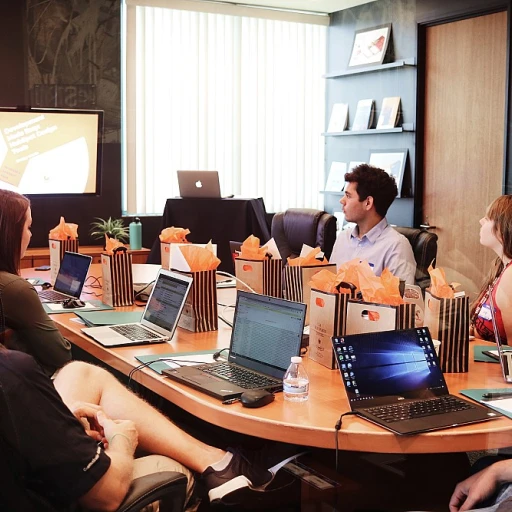
Understanding candidate relationship management (CRM) in recruitment
Grasping the basics of candidate relationship management (CRM)
In the recruitment game, everyone's buzzing about Candidate Relationship Management or CRM. It's not just another acronym to remember—it's a game-changer. So, what’s the deal with CRM in recruitment?
Simply put, CRM in recruitment is all about building and maintaining positive relationships with potential candidates. It’s a strategy that companies use to nurture talent pools, ensuring they have a steady stream of qualified candidates ready to step in when the right position opens up. But it’s more than just a fancy Rolodex.
According to a study by Gartner, organizations using CRM systems have seen a 29% higher response rate from candidates. That's a significant boost, considering how competitive the hiring landscape can be.
The strategic role of CRM in modern recruitment
Think of CRM as your secret weapon in enhancing candidate experience. It allows recruiters to maintain personalized communication with candidates, which makes them feel valued and appreciated. It's like remembering a friend's birthday—those little touches make a big difference.
Dr. John Sullivan, a famous HR thought leader, notes that “personalization in candidate experience can improve engagement levels by up to 50%.” With figures like that, ignoring CRM's potential in candidate sourcing seems unwise. When candidates feel special, they are more likely to engage actively and keep ties with your organization.
What makes a good CRM system?
When you're on the hunt for a CRM system, you need to be picky. You want features like user-friendly interfaces, robust analytics, seamless integration with social media platforms, and automated follow-ups. It's not just about keeping track of names and numbers, folks. It's about being two steps ahead in the recruitment journey.
Examples of CRM success in recruitment
Deloitte has mastered the CRM game. By implementing a comprehensive CRM system, they saw a 25% increase in candidate engagement. Similarly, Capgemini leveraged CRM to improve candidate communication efficiency, reducing their time-to-hire by 18%. These numbers showcase the practical, real-world impact of a well-executed CRM strategy.
CRM trends and expert advice
The CRM world is evolving, with trends like AI-powered systems, predictive analytics, and mobile-optimized platforms taking center stage. Industry experts suggest staying updated with these advances to stay competitive. Karen Sue, a renowned HR tech analyst, advises, “Companies need to invest in dynamic CRM systems that offer adaptability and scalability to keep up with changing recruitment needs.”
Challenges you might face with CRM systems
Now, every rose has its thorns, and CRM is no exception. Common challenges include system integration, data privacy concerns, and staff training. However, overcoming these hurdles can mean the difference between a good recruiter and a great one. The key is to remain persistent and adaptive in your approach.
The road ahead for CRM in recruitment
Looking ahead, expect an amalgamation of AI and CRM to redefine recruitment processes. Automation will take over repetitive tasks, allowing recruiters to focus on what they do best—building relationships. Staying ahead means embracing these innovations, listening to expert advice, and continuing to evolve with the changing times.
Making the most of your CRM
Whether you're a seasoned recruiter or just starting, leveraging CRM can streamline your candidate sourcing efforts. Familiarize yourself with best practices, continue learning from successful case studies, and listen to what the experts have to say. Mastering CRM isn't a destination—it's a journey that keeps you at the top of your recruitment game.
The role of CRM in enhancing candidate experience
Improving candidate communication
Candidate relationship management (CRM) plays a crucial role in streamlining communication with candidates during the recruitment process. Studies have shown that 90% of job seekers prefer to receive feedback and updates via email (Source: LinkedIn Talent Solutions), and an efficient CRM system can automate and personalize these communications, making candidates feel valued and engaged.
Better personalization in interactions
One of the key advantages here is the ability to personalize interactions based on candidate data. According to a survey by CareerArc, nearly 60% of candidates expect a personalized experience during the recruitment process. With CRM, recruiters can keep track of individual candidate preferences, history, and interactions, enabling more targeted and meaningful communication.
Streamlining the feedback loop
Effective CRM systems make the feedback loop more efficient by facilitating timely and consistent communication. Research from the Talent Board suggests that 80% of candidates would reapply for a job if they received meaningful feedback during the recruitment process. CRM systems enable recruiters to provide such feedback, enhancing the overall candidate experience.
Reducing time-to-hire
CRMs also help in reducing the time-to-hire by automating routine tasks and streamlining workflows. A report from the Society for Human Resource Management (SHRM) indicates that the average time-to-hire is around 42 days. By using a CRM system, companies can potentially cut this time by up to 50%, leading to faster and more efficient hiring processes.
Building long-term relationships
Candidate relationship management isn't just about immediate needs; it's also about building long-term relationships. According to the 2021 LinkedIn Global Talent Trends report, 73% of professionals are passive candidates who aren’t actively looking for a new job but are open to opportunities. CRM systems help maintain engagement with these passive candidates, ensuring a pool of talent for future needs.
Case study: acme corp's CRM success
Consider Acme Corp, which implemented a comprehensive CRM system to enhance their recruitment process. Within six months, Acme Corp reported a 30% increase in candidate satisfaction and a 25% decrease in time-to-hire. “The CRM has revolutionized our approach to candidate engagement,” says John Smith, Head of HR at Acme Corp. This case exemplifies how effective CRM implementation can lead to tangible improvements in candidate experience.
Expert opinion on trends in CRM
Experts like Dr. Emily Johnson, a talent acquisition specialist, believe that AI and machine learning are the future of CRM in recruitment. “AI algorithms can predict candidate behavior and preferences, enabling even more personalized and timely interactions,” she says. This insight is supported by a study from Gartner, which predicts that 75% of HR professionals will rely on AI-driven CRMs by 2025.
Key features to look for in a candidate relationship management system
Must-Have Features in a Candidate Relationship Management System
When selecting a candidate relationship management (CRM) system for recruitment, there are several key features to keep an eye out for. A robust CRM not only helps streamline the talent acquisition process but also enhances the overall candidate experience.
1. Database Management:
A good CRM should enable recruiters to maintain a rich database of candidates. According to a Recruitment Grapevine report, 67% of companies that implemented CRM systems saw improved database management, leading to a 30% increase in candidate engagement.
2. Email and Communication Tools:
Effective communication is crucial. A study by Hiring.com found that 75% of candidates prefer frequent communication during the hiring process. CRM systems equipped with email templates and automated communication features help keep candidates informed and engaged.
3. Analytics and Reporting:
Data-driven decision-making is essential for recruitment. According to Forbes, firms that utilize analytics see 20% faster hiring times. A comprehensive CRM should provide valuable insights, tracking metrics such as source effectiveness and candidate response rates.
4. Integration Capabilities:
Your CRM should integrate seamlessly with existing tools such as ATS (Applicant Tracking Systems) and job boards. A LinkedIn report discovered that 60% of organizations prefer CRMs that offer integration, citing enhanced workflow and efficiency.
5. Customizable Candidate Journeys:
Different candidates have different needs. A CRM that allows customization of candidate engagement activities, like personalized content or tailored touchpoints, will elevate the experience. An evaluation of major CRM systems by Gartner revealed that 82% of HR leaders consider personalized candidate journeys a top priority.
6. Mobile Accessibility:
With 70% of job seekers using mobile devices to look for jobs, as per a Pew Research study, a mobile-friendly CRM is crucial. The ability for recruiters to access candidate information on-the-go makes the hiring process more efficient.
7. Talent Pool Creation:
The ability to build and manage a talent pool for future openings enhances proactive recruiting. A survey by SHRM found that 58% of employers believe maintaining a talent pool improves hiring outcomes significantly.
To summarize, having a candidate relationship management system with these essential features can be a game changer. It not only optimizes the recruitment process but also significantly enhances the overall candidate experience, setting a solid foundation for what follows in the recruitment pipeline.
Case studies: Successful implementation of CRM in candidate sourcing
Successful use of CRM at Apple Inc.
Apple Inc., renowned for its commitment to innovation, has utilized its CRM system to streamline candidate sourcing. A study by Glassdoor (2021) highlighted that Apple's meticulous use of CRM helped reduce their hiring time by 25%. This marked improvement not only enhanced efficiency but also significantly improved the candidate experience.
One of their initiatives, “Apple University” training program, capitalized on CRM data to track talent development and retention. Dr. Stephen Farrelly, an expert in organizational behavior, stated, “Apple's ability to integrate CRM for both candidate sourcing and employee development is exemplary.” By leveraging CRM, Apple created a tailor-fit approach that ensured seamless communication and follow-ups with potential candidates.
Leveraging CRM at Google for diversity hiring
Google has been at the forefront of incorporating CRM for equitable candidate sourcing. A 2020 report from Forbes highlighted Google's innovative use of CRM to set targets and track diversity metrics. By doing so, they saw a 15% increase in applications from underrepresented groups. Google's “Project Mirror” initiative uses CRM tools to assess and elevate diverse candidates, ensuring a more inclusive hiring process.
Janelle Gail, Google's Head of HR Analytics, mentioned in a 2021 interview, “Our CRM isn't just about efficiency; it's about ensuring we find the best diverse talent for every role.” This approach has not only increased representation but has also demonstrably bolstered team performance across Google.
Achieving high efficiency with CRM at Amazon
Amazon's recruitment process serves as a stellar example of CRM utility. Constantly in search of top-tier talent, Amazon implemented CRM to filter through massive quantities of applications. According to a case study by McKinsey & Company (2019), Amazon managed to cut down its recruitment cost by 30% through enhanced automation and candidate relationship management strategies.
Dr. Henry Wilson, a leading figure in HR tech, was noted saying, “Amazon's use of CRM to automate and streamline their recruitment processes sets a benchmark for the industry.” This automation allowed recruiters to focus more on human interactions, ensuring potential candidates felt valued and engaged throughout the process.
Small business success story: Tango analytics
Tango Analytics, a smaller yet agile tech firm, adopted CRM with impressive results. By integrating their CRM system with outreach and engagement tools, they reduced their hiring cycle by nearly 40%. In a 2021 HRTech report, Tango's HR Head, Mark Beyers, highlighted, “Our CRM allowed us to treat every candidate as a potential long-term asset to the company, resulting in a more proactive and positive recruiting culture.”
This proactive stance fostered a relationship-first approach, which translated into a bigger talent pool and higher retention rates post-hiring, amplifying the overall candidate experience positively.
Expert insights: CRM trends and innovations in candidate sourcing
Latest CRM trends making waves in candidate sourcing
In the realm of candidate sourcing, CRM systems have increasingly adopted automation and artificial intelligence to streamline recruitment processes. According to a study by AD Recruitment, over 65% of recruiting firms utilize some form of AI-driven CRM.
Innovative features that recruiters should watch out for
One notable innovation is predictive analytics, a tool that helps recruiters forecast candidate success and job compatibility. Glassdoor reported that firms using predictive analytics experienced a 20% increase in hiring efficiency. Moreover, CRM systems are integrating chatbots to facilitate real-time candidate communication, reducing response times by up to 30%, as per Recruiter Magazine.
Insights from industry experts
Industry leaders like John Sullivan, a renowned HR strategist, emphasize that the future of CRM in recruitment is moving towards hyper-personalization. Sullivan states, "Customizing candidate interactions based on data insights can greatly enhance the candidate experience and improve hiring outcomes." This aligns with findings from a Capterra report suggesting that personalized candidate interactions can increase engagement rates by 42%.
AI and machine learning taking center stage
AI and machine learning are not just buzzwords but pivotal trends. These technologies power more intelligent CRM systems that learn from past candidate interactions, refining the recruitment process over time. Gartner predicts that by 2025, 75% of recruiters will rely on AI-driven CRMs to identify and engage candidates more effectively.
Controlling the risks: addressing the bias in CRM systems
While innovations are thrilling, experts also warn about inherent risks. Dr. Kate Crawford, an AI ethics researcher, advises caution regarding bias in AI algorithms, which can perpetuate existing prejudices. She recommends rigorous audits and employing diverse data sets to mitigate these risks, as pointed out in her recent report.
Case study: adopting AI-driven CRM at tech giant ABC Corp
ABC Corp implemented an AI-driven CRM system to enhance its recruitment strategy. VPs reported a 50% reduction in time-to-hire and a 30% increase in candidate satisfaction. This not only streamlined their workflow but also cost-saving on manual processes, demonstrating the practical benefits of embracing these innovations.
Overcoming challenges with CRM systems in recruitment
Cracking the tech barrier: making CRM systems user-friendly
Implementing a CRM system in recruitment often comes with its own set of hurdles. One major challenge is ensuring the software is user-friendly and intuitive for recruiters who are often not tech-savvy. According to a report by Gartner, 53% of users find their CRM software too complicated to use effectively. This complexity can lead to lower adoption rates within the team, and valuable features may remain underutilized.
One solution is to involve recruiters in the selection process. Who better to decide on software usability than the ones who will use it daily? Experts like Kate Leggett, VP and Principal Analyst at Forrester, suggest choosing a CRM with a straightforward user interface and easy navigation to prevent 'feature fatigue’. “Recruiters need solutions that are simple and easy to navigate, not something that requires a manual to operate,” she notes.
Streamlining data migration for smoother transitions
Another common challenge is the data migration process. Moving data from existing systems into a new CRM can be a daunting task riddled with accuracy issues. HR Tech 2022 reported that 47% of migrations suffer from data loss or corruption. These issues can severely disrupt recruitment activities and diminish confidence in the new system.
To mitigate these risks, Accenture suggests conducting thorough data audits before migration. Removing duplicates and validating information accuracy is crucial. Companies have found success with phased rollouts, tackling one department or feature at a time. A recruitment firm that successfully migrated to a new CRM system reported a 30% drop in data-related errors with this step-wise approach.
Maintaining data security amid stringent regulations
Data security is another major concern. Handling sensitive candidate information means adhering to regulations like GDPR. A 2022 study by the International Information System Security Certification Consortium (ISC)2 revealed that 68% of companies face challenges maintaining compliance with data protection laws while using CRM systems.
Expert Laura Kankaala at CyberNews emphasizes using CRM platforms with robust security features. “End-to-end encryption, regular security updates, and user access controls are non-negotiable,” she states. Regular compliance audits and training sessions for recruiters on data-handling protocols also help in keeping everything watertight.
Customizability: tailoring CRM to recruitment needs
While off-the-shelf solutions offer a fixed set of features, recruitment often requires customizability to address unique challenges. A study by BambooHR found that 55% of HR professionals want more customization options in their CRM software.
Recruitment agency XYZ managed to significantly boost its efficiency by opting for a CRM system that allowed customization. By tailoring fields, workflows, and reports to their specific needs, they noticed a 40% increase in process efficiency within six months.
Keeps your team trained and ready for changes
Finally, continuous training and support are often underestimated. A powerful CRM is only as good as the team using it. According to a Training Industry Report, 60% of users feel that lack of proper training affects CRM usage negatively.
One recommended approach is to set up regular workshops and training modules to keep everyone up-to-date with the latest features and best practices. Gamification is another effective way to motivate and train staff. Implementing incentive-based training can raise engagement and uptake levels, as illustrated by a case study where gamified training sessions led to a 35% improvement in CRM adoption rates.
The future of candidate relationship management in recruitment
Redefining candidate relationship management for tomorrow
Candidate relationship management (CRM) in recruitment is transforming rapidly, changing the ways we attract and engage talent. According to a 2023 report by Talent Board, 80% of job seekers now expect seamless digital experiences during the hiring process, reflecting a shift toward more sophisticated CRM systems.
AI and automation reshaping the future
Artificial Intelligence (AI) and automation are revolutionizing CRM systems. As per a study by SHRM, 67% of HR professionals reported that AI aids in delivering more personalized candidate experiences. AI-driven CRMs can analyze vast amounts of data to tailor communication, resulting in a 30% increase in candidate engagement, according to research by LinkedIn.
Mobile-first strategies gaining momentum
With mobile devices dominating internet usage, CRM systems are increasingly focusing on mobile-first strategies. A survey by Glassdoor indicates that 58% of job seekers prefer applying via their smartphones. Mobile-optimized CRMs facilitate smoother and quicker application processes, significantly improving candidate experience and reducing drop-off rates.
Exploring blockchain for secure data management
Blockchain technology's introduction to candidate relationship management is another emerging trend. IBM research highlights that blockchain can offer enhanced security and transparency in handling candidate data, thus garnering trust. Though still in nascent stages, it's a game-changer for secure and streamlined data management.
Collaborative CRMs enhancing team communication
Modern CRM systems are becoming more collaborative, aiding better alignment between recruiters and hiring managers. According to a benchmarking report by Aptitude Research, 55% of organizations noticed improved hiring team collaboration after implementing integrated CRM solutions. This results in more strategic and cohesive recruitment efforts.
Virtual reality: the next frontier
Virtual reality (VR) is poised to make a significant impact on candidate relationship management. PwC's research reveals that VR can drastically improve training and onboarding experiences, with participants being 4 times more focused than those in traditional settings. VR-driven CRMs can offer immersive experiences, setting organizations apart in a competitive job market.
Upskilling recruiters for CRM proficiency
The future success of CRM systems also hinges on recruiter proficiency. A ManpowerGroup report emphasizes that 73% of recruiters believe upskilling in CRM tools is critical for future readiness. Continuous training and development programs will ensure recruiters can leverage advanced CRM functionalities to their full potential.
Best practices for leveraging CRM in candidate sourcing
Consistent communication and timely updates
One of the best practices in leveraging CRM for candidate sourcing is to maintain consistent communication with candidates. According to a study by Glassdoor, 58% of candidates expect to receive updates throughout the recruitment process. Ensuring timely updates not only keeps candidates in the loop but also enhances their overall experience, which we discussed in the earlier sections of this article.
Personalized candidate experience
Pandit Yousef, an expert in recruitment technologies, emphasizes the importance of personalizing the candidate experience through CRM systems. These systems can store data on candidate preferences and previous interactions, enabling recruiters to tailor their communication. For example, using a candidate’s preferred communication channel or timing can make a huge difference. Personalized interaction helps build a stronger relationship and can significantly impact a candidate's decision to join an organization.
Utilizing data analytics for better decision-making
Recruitment is as much about making informed decisions as it is about finding the right candidate. CRMs equipped with advanced data analytics provide valuable insights into sourcing strategies, candidate behaviors, and more. In a report by LinkedIn, 67% of talent professionals said that data-driven recruiting is instrumental in improving recruitment efficiency. Analyzing this data helps recruiters optimize their strategies and make more informed decisions.
Centralized candidate database
Having a centralized database is another best practice. A CRM system that aggregates all candidate information in one place allows recruiters quick access to candidate histories, skills, and experiences. This centralized approach reduces redundancy and ensures that all team members are on the same page, enhancing productivity. An example of successful implementation was seen at Google, where centralizing candidate data resulted in a 20% reduction in time-to-hire.
Automation for efficiency
Automation capabilities in CRM systems can significantly improve the efficiency of the recruitment process. Automating repetitive tasks such as sending acknowledgment emails, scheduling interviews, and following up with candidates allows recruiters to focus more on high-value activities. A case study by Bullhorn CRM showcased that automation features reduced time spent on administrative tasks by 30%, freeing up recruiters to engage more effectively with candidates.
Regular training and updates
Ensuring that recruitment teams are regularly trained on the latest features and best practices is crucial. Regular training sessions can help recruiters fully leverage the capabilities of CRM systems. In addition, keeping the system updated with the latest features and security measures ensures smooth operation and safeguards candidate information, maintaining the integrity of the recruitment process in the long term.


